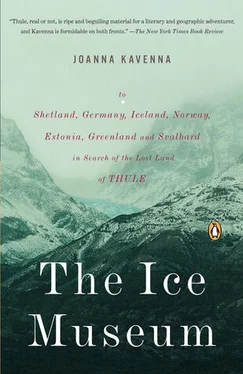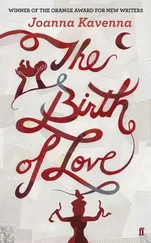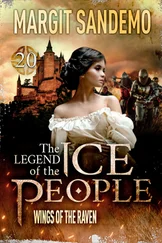The barman passed me a glass of aquavit, which I drank slowly, sitting outside the circle of light from the fire. I found I was thinking about the past, about my childhood fascination with polar explorers, and the simple sense I had of things at the time. As a child I merely loved the cold; winters were never cold enough, even when the snows fell and blocked the roads, and there was sledging on the low hills of Suffolk. Sometimes the river at Flatford was crusted with ice; the church at East Bergholt surrounded by whitened graves. When it snowed the morning was muffled, footfalls faded into the whiteness outside, cars slid along the roads. It was a time when car engines failed in the cold mornings; the rising street was a chorus of spluttering seventies’ cars, struggling to hit the high note, when the engine would spark to life. A series of emphysemic coughs came from each drive, with the contrapuntal sound of rising frustration, keys jangling in the ignition, the slam of the door. The windows were patterned with hieratic displays of ice, crystals glistening on the other side of the glass.
These earliest memories were focused around small novelties—the spectral phenomenon of visible air, as I breathed out on a cold day, the sharp sensation of chilled oxygen entering my lungs. The infant games, the fresh snow like a blank page, waiting for the imprint of child shoes, the crisp whiteness cold and damp in my hands. In the snow branches were beautiful, like the ghosts of trees, haunting the edges of the village where the streets became fields. And there were the long evenings, when I thought the roads looked like dark rivers, between the shores of streetlights.
When I read stories of polar exploration, I lingered over the descriptions of intense cold; and when my brother and I played at explorers we were always lost in the storm, beaten by frigid winds. To me, the tales of exploration were more mesmerizing than the fairytales I was supposed to enjoy. Dutifully, with mounting boredom and confusion, I read through the tales of princesses, princes, the whole range of fairytale royals, choking on apples, pricking their fingers, sleeping, waking with dwarfs, generally misbehaving. Discarding the multicoloured child-friendly books, I pored over the explorers’ diaries, the immaculate records of pemmican eaten, pemmican stored, oil cans squandered to the frost, gloves dropped on the snow, never recovered, the sighting of a seal, six o’clock, gun jammed.
It was the chill of the stories that made them appeal to me. I never responded with such excitement to adventures from deserts or lukewarm places. There was something in the stillness of the ice which gripped me, stillness like suspense, an empty stage ready at any moment for the grand entrance of another explorer, struggling against the snow. I liked the shifting illusions of the Arctic—the bergs which hid their depths in the sea, rising like drifting mountains, the crevasses under a thin surface of ice. I memorized lists of countries, lists of explorers: Britain, Norway, Iceland, Greenland, Wilson, Oates, Bowers, Scott, Shackleton, Bjaaland, Johansen, Amundsen. An exotic pantheon, to me. The ships ploughing a furrow through the pallid ocean, towards the great walls of ice. The explorers sounding the refrain—death or glory, a heroic return to a bunting-festooned quayside, or a fading away into the silence of the snow. Some sailed in ships doomed to founder, their wreckage found drifting on floes; men who would become mysteries themselves, never seen again, never heard of. Or years later, a diary would be found at a frozen last camp; they lugged their diaries to the end, recording the dwindling strength of their colleagues—the death of the first officer from a malady which swelled his limbs, the death of the oceanographer who had eaten rotting seal flesh. I imagined these explorers as a series of shadows, stumbling over brilliant white snowfields. Pitching another flag, in the middle of an interminable nowhere, leaving it fluttering against the snow.
The famous names of British exploration went south: Captain Robert Scott, Ernest Shackleton, ‘Titus’ Oates. Yet I somehow preferred the stories about the north. When, aged eight, I first read about Scott’s race with Roald Amundsen for the South Pole, I pitied Oates, who disappeared into the ice, in the howling storm: I pitied them all, Scott and Wilson and Bowers, lying in their tent, the sides lashed by the gales, writing their farewells, struggling to grip their pens. Later, I felt my sympathies sliding towards Amundsen, who packed abundant supplies, and raced on skis towards the South Pole, returning without losing a man. Amundsen was a wiry man with a great beak nose, fascinating and grotesque to a child. He had seemed to me like an exotic creature, found only on crazy polar trips. With slick thrusts of his skis, pushing across the ice, following the dogs dragging sledges, he had made Scott’s exhausted labours look like wilful masochism. He had skied to the South Pole, joyfully, brilliantly, with a pack of sliding ace skiers around him. Then, after the thrill of the Antarctic race, he had sailed to the Arctic, and disappeared for seven years, into the ice around the North Pole. It intrigued me that a man could disappear for so long, refusing the applause of the crowds, shrouding himself in the silent ice.
When I first read about the explorers, I knew almost nothing; I relied on imagination to understand their accounts. I accepted their diaries as literary works, creating a world with its own rules. I absorbed the set paragraphs about preparation, fund-raising, skis, sledges, dogs, ponies, tents and supplies of pemmican. I made up polar vistas in the garden: a ragged tent became shelter from an Arctic storm, domestic objects could be transformed entirely. It was a turning-in of the senses, as if sensory signals came most forcefully from the imagination. The idea of the strange, as distinct from the everyday, was unintelligible to me, as a child; the two worlds constantly coincided. There was nothing unusual about my childhood fascination. I recall days with friends, spent in a sort of collective hallucination, entirely absorbed in a polar world we had created. We would imagine we were on a ship in a storm, sitting in a playground with a few swings. Or I would wake in a pensive mood, thinking of snow plains and rocks, and drag my brother into the garden to perform a chaotic series of imaginary expeditions.
There was a formulaic element to the explorers’ accounts that made them understandable, and they were written in a simple pared-down prose easy enough for a child to read. Only Nansen was aloof and baffling, a little cranky, given to floating phrases, phrases which took off into something I had no knowledge of at all, references to remote places, to strange people: Pliny, Seneca, Geminus of Rhodes, Pomponius Mela.
But the descriptions of colours, of the myriad colours of the ice, were clear—the pack ice, the play of light against frozen water, the vivid rainbows, the ice crystals shining in the mist, like a halo. Knowing nothing of the places the explorers went to, I responded to the force of their words—to Scott’s poetic soliloquy, one man in an icy tent, writing notes with a trembling hand, hoping they might be found later. I responded to Nansen’s endlessly floral prose, to Bjaaland’s caustic diary entries, to Amundsen’s brisk phrases. The explorers did not know exactly what they would find at the extremities of the earth, though there were dozens of theories—from the fashionable to the dismissed—most of them inaccurate. When Nansen sailed it was still a matter of debate whether he would emerge onto ice or land. They saw the world in a different way from us—their maps were incomplete, furnished at their edges with question marks and hypotheses. As I grew up, I wondered what exploration meant at this time, when vast areas were still truly unknown, untouched by humans. It must have been disorienting, I thought, to live in the world when its edges were vague, falling into shadows. When nothing was known, imagination was the only option—and this made the experts like children, creating fictional worlds to compensate for ignorance; lacking experience, they dreamed of what might lie in the silent wastes. The nineteenth-century theories of treasures at the Pole, of an ancient island blanketed with ice and gold, were eventually as discredited as the fantastical outpourings of medieval clerics, or classical geographers who claimed that the far north was inhabited by unipeds and immortals.
Читать дальше












